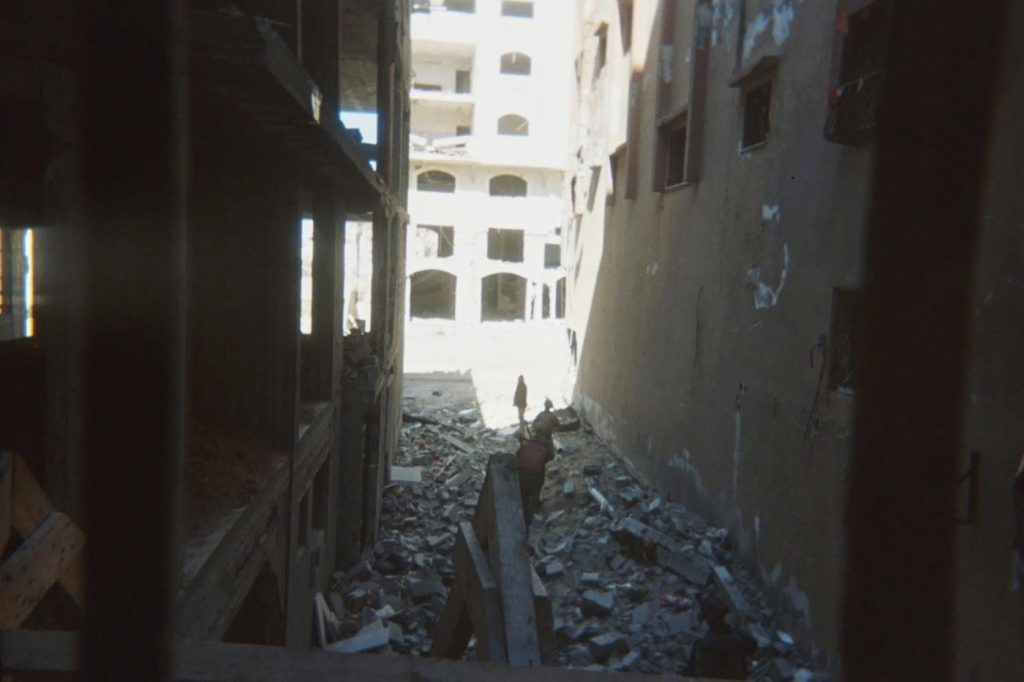TEL AVIV, Israel (AP) — A Palestinian man, Ayman Abu Hamadan, detailed his harrowing experience of being used as a human shield by Israeli soldiers during a military operation in the Gaza Strip last summer. Abu Hamadan explained that for 17 days, he was forced to enter houses dressed in army fatigues with a camera attached to his forehead, to ensure they were free of bombs and armed militants. During this time, he was subjected to physical abuse and threats of death to compel his cooperation.
Reports from various Palestinian individuals and Israeli soldiers indicate a troubling trend where Israeli troops have systematically employed Palestinians as human shields. This practice involves forcing local individuals to clear buildings and tunnels, often under duress, leading to significant dangers for those coerced into participation. An Israeli officer, seeking anonymity, confirmed that nearly every platoon utilized Palestinians in this manner, suggesting an institutionalized approach to the practice.
In response to these serious accusations, the Israeli military asserted that it explicitly prohibits the use of civilians as shields, a condemnation typically directed at Hamas. They claim that all orders to avoid involving civilians in military operations are routinely emphasized to the troops. Nevertheless, the military has begun to investigate several reported cases of Palestinians being coerced into these roles but remains tight-lipped regarding the scale of the practice or the potential directives from higher-ranking officers.
Ayman Abu Hamadan's account reveals he was separated from his family in August 2024 when soldiers claimed he would assist with a "special mission." Once in the field, he recounted the harrowing conditions, forced to inspect buildings where soldiers subsequently entered to damage or destroy property, all while he was kept bound and blindfolded at night.
Human rights organizations have noted that the use of Palestinians as human shields is not a new tactic but has reportedly become even more prevalent during the ongoing conflict. The Israeli Supreme Court ruled against the practice in 2005, yet violations have continued. Experts contend that this current war has marked a significant escalation in both the frequency and public discourse surrounding the issue.
Testimonies from Israeli soldiers suggest that many commanders are aware of the practice and sometimes actively endorse it. Some referred to the use of human shields as the “mosquito protocol,” creating a chilling atmosphere among the troops where the dehumanization of Palestinians was commonplace. As the conflict intensified following the Hamas attacks on October 7, 2023, by mid-2024, the method reportedly became widespread among Israeli units, driven by operational efficiency and a desire to mitigate risk during dangerous missions.
Soldiers also reported that when they attempted to refuse the orders, they faced overwhelming pressure, including being told not to worry about international humanitarian law. An account from a soldier indicated the psychological toll taken on those forced to use civilians in combat scenarios, emphasizing the moral conflict faced by many troops amidst the ongoing violence.
Further compelling testimonies came from individuals like Masoud Abu Saeed, who described being used as a human shield while compelled to search for suspected tunnels, fearing for his life and longing for his children. The anguish shared by those affected illustrates the profound consequences of such tactics. Hazar Estity recounted her experiences in the Jenin refugee camp, being forced to film apartments, yearning to reunite with her young son, illustrating the personal toll of these military practices.
The accounts from both sides depict a troubling reality: while Israel condemns Hamas for employing civilians as shields, similar methods appear to be in practice within its own military framework, amplifying concerns about international law violations and the ethical implications of ongoing military operations.











